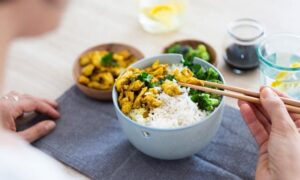There is nothing as demanding and challenging physically and emotionally as breastfeeding.
As a mom, you should be conscious of your breastfeeding diet. This is because your baby consumes what you eat or drink, too, hence the need to pay close attention to your feeding habits while breastfeeding.
Hearing a breastfeeding mother ask, ” Can I eat chicken curry while breastfeeding ” is a normal question. It is our responsibility to care for and protect our babies.
In this article, your question of whether I can eat chicken curry while breastfeeding will be provided here, along with answers to other frequent questions you may be worried about.
Can I Eat Chicken Curry While Breastfeeding?
You can eat chicken curry while breastfeeding your baby; eating chicken curry or other spicy foods to soothe your taste buds while breastfeeding does not cause any harm to you or your child.
There has not been any evidence supporting the speculation that spicy food, or even chicken curry, mainly affects the baby’s health when eaten during breastfeeding.
Research has proven that exposing your baby to different flavors helps them adjust to food varieties once they start taking solid food.
Eating chicken curry while breastfeeding does affect the taste of breast milk, and your baby notices this change in the taste of breast milk as a result of the consumption of chicken curry by the mom.
Instead of harming your baby, it makes them more open and willing to incorporate a variety of flavors into their diets once they start eating solid foods.
Read: 8 Foods That Make Breast Milk Taste Good
What Foods Should I Avoid During Breastfeeding?

Even though you are encouraged to satisfy your taste bud’s cravings for a chicken curry while breastfeeding your baby, it shouldn’t be a license to satisfy your cravings for all kinds of foods.
Eating chicken curry while still breastfeeding is ok since there are no detrimental effects on your or your baby’s health.
But some foods should be avoided in totality while breastfeeding because of the adverse effects they might have on you or your baby or, most times, on both of you, and they include:
- Fish that are high in mercury.
- Herbal supplements unless approved by your health care provider.
- Avoid consuming a lot of parsley because it can stop the flow of breast milk when consumed in large quantities.
- Too much sage and peppermint can affect the supply of breast milk.
- Gassy foods may increase the tendency of your baby to become colicky and gassy.
- Foods that you are sure to trigger your allergies.
Read: Eating Honey Mustard While Breastfeeding – Is it safe?
Foods To Take In Moderation While Breastfeeding
There are foods to take into moderation during breastfeeding.
These foods do not pose a health hazard to you or your baby when consumed moderately.
Excessive consumption of the foods can pose serious health to your baby, so be mindful when consuming them. These foods include
1. Caffeine
Caffeine is a compound found in certain plants, and they usually have effects on the nervous system hence the term stimulants, because they improve alertness and energy levels.
Caffeine can be consumed while breastfeeding but should be done moderately.
When caffeine enters the bloodstream, it finds its way from your bloodstream to that of your little one through lactation or breastfeeding.
Most babies are unaffected, but you know there are individual differences; some sensitive babes may be affected by caffeine intake.
They may become extra fussy or wakeful after consumption of breast milk with the presence of caffeine.
After consuming a caffeinated beverage, the quantity in your breast milk is usually at its peak two hours after consuming caffeine-laden food or drinks.
Health experts recommend limiting daily caffeine intake to less than 300 milligrams.
When you notice that there are effects on your little one after consuming caffeine, you should cut down on the caffeine consumed and observe your baby to see if you will notice any improvement.
Time your caffeine intake to ensure you do not consume caffeinated food or beverage right before you breastfeed so that the caffeine will have worked its way out of your system before breastfeeding time.
2. Alcohol
You can take alcohol moderately during breastfeeding, but be sure that it can go into your baby’s system through breast milk.
If you notice that you have consumed a high quantity of alcohol, we recommend waiting for the alcohol to be cleared from your system before you begin breastfeeding.
By the time the alcohol clears off your system, the chances of its presence in your breast milk will be negligible.
The American Academy of Pediatrics encourages a lactating or breastfeeding mother to take alcohol after a breastfeeding session and should wait for another two or three hours before breastfeeding.
Before the next breastfeeding session, the body would have had ample time to clear alcohol off its system.
3. Excessive flavors and spices
Your dietary pattern reflects the quality and taste of your breast milk.
Eating chicken curry while breastfeeding isn’t harmful, but consuming many flavored foods and beverages is not encouraged.
Sometimes the presence or flavors of food like garlic, onions, or even spices may cause your baby restlessness.
The baby may also become fussy after eating or refuse to feed entirely. So consumption of flavors and spices should be in moderation.
Read: Eating Pizza While Breastfeeding
Eating Chicken Curry While Breastfeeding: FAQs
What spices should I avoid while breastfeeding?
You should avoid Peppermint, Parsley, and Sage.
Consuming a lot of parsley could curb lactation. And excessive consumption of sage and peppermint may cut your milk supply. Some breastfeeding moms even found peppermint-flavored toothpaste and candies a problem.
Does curry Flavour breast milk?
During breastfeeding, cinnamon, garlic, curry, and chili won’t harm you or your baby, but they may give your milk an unpleasant taste.
The last thing you want as a nursing mom is your baby refusing to feed due to the taste of your milk. After all, you couldn’t resist the curry.
Can I drink milk while breastfeeding?
No evidence supports the claim that consuming milk or dairy products improve breast milk supply.
In contrast, drinking milk provides many benefits for breastfeeding mothers, and should be included as part of a healthy diet, if you or your baby are not allergic.
Do eggs increase breast milk?
According to the researchers, increased maternal egg consumption is associated with higher breastmilk ovalbumin levels and higher immune tolerance measures in infants.
These results indicate that maternal diet may enhance infant oral tolerance during lactation.
Can spicy food make babies gassy?
If your baby becomes fussy each time they consume spicy food, you should avoid it for a while and see what happens.
Many moms claim that kale, spinach, beans, onions, garlic, peppers, or spicy foods cause infant gas, while other babies tolerate these foods just fine.
What food is best for breastfeeding?
Include protein foods (meat, poultry, fish, eggs, dairy, beans, nuts, and seeds) 2-3 times per day.
Eat three servings of vegetables daily, including dark green and yellow vegetables.
Eat two servings of fruit each day. Also, add some whole grains (whole-wheat bread, pasta, cereal, and oatmeal) into your daily diet.
Can I eat a banana while breastfeeding?
Banana is a high-calorie fruit that will help with hunger pains while breastfeeding, and it helps boost your folic acid levels.
Furthermore, potassium-rich bananas can help nursing mothers maintain fluid and electrolyte levels, keeping their milk flowing.
Related Posts:
- Foods That Make Breast Milk Taste Bad
- Can I Eat Popcorn While Breastfeeding
- What To Eat To Prevent Gas While Breastfeeding
- Can I eat clam chowder while breastfeeding? Explained
Wind Up
I hope this article has given in-depth knowledge to answer the question of can I eat chicken curry while breastfeeding?
I hope you’re better informed and convinced that eating chicken curry or any other spicy to soothe your taste buds while lactating or breastfeeding doesn’t cause any harm to you or your baby.
There has not been any evidence supporting the speculation that spicy food, or even chicken curry, mainly affects the baby’s health when eaten during breastfeeding.
Instead, researchers suggest that exposing your baby to different flavors aids them in adjusting to varieties of food once they start taking solid food.
